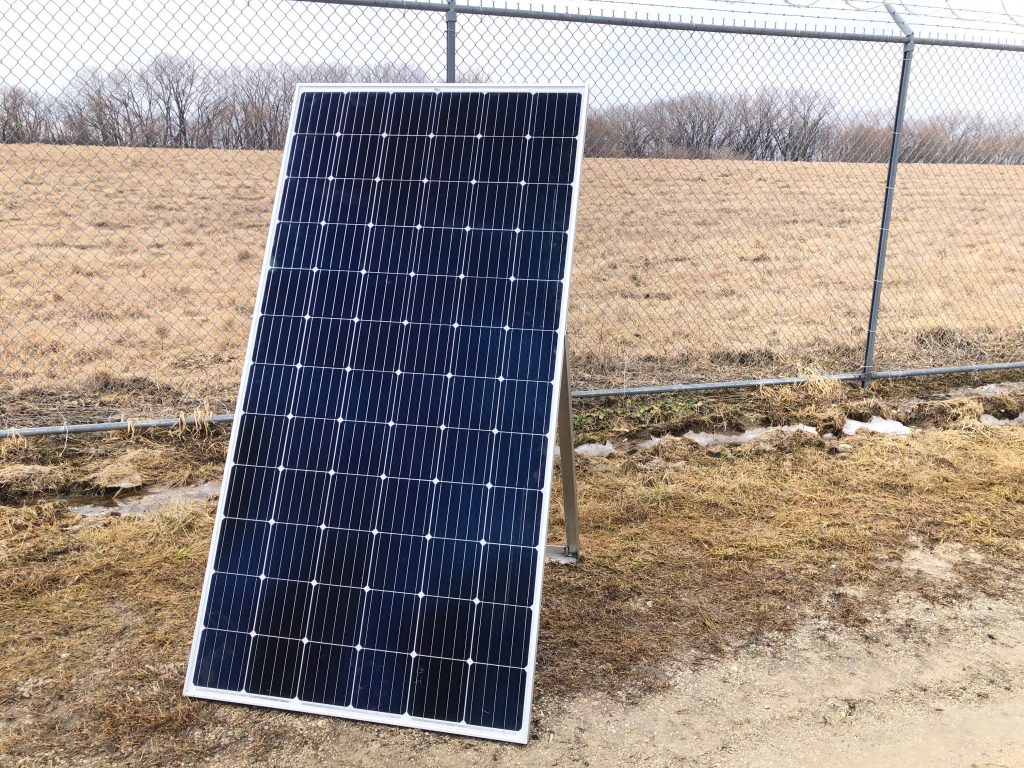Evers Wants Local Climate Change Plans
Governor's budget would require every local government in state to create a plan.

Solar panel displayed at 1600 E. College Ave. as part of an announcement of a plan for a 7,000 solar panel array. Photo by Jeramey Jannene.
Democratic Gov. Tony Evers wants every local government in Wisconsin – ranging from Milwaukee (population 594,548) to the Village of Lowell (population 253) in Dodge County – to develop a climate change response. The official summary of Evers’ 2021-23 state budget describes that mandate this way:
“Require a comprehensive plan be developed by municipalities to address climate change, require that local hazard mitigation plans include climate change, and require communities throughout the state to include climate change in their community health improvement assessment and plans.”
In his budget address, Evers said every Wisconsin resident “has experienced the effects of climate change” and “increased flooding caused in large part by climate change, has cost Wisconsin communities, businesses, farmers, and families millions of dollars.”
Evers said his budget includes $30 million for “proactively floodproofing, ensuring public safety and … [to] help municipalities address at-risk properties and infrastructure with programs that help build adaptable roads and infrastructure, and restore wetlands to prevent catastrophic flooding.”
Curt Witynski, deputy director of the League of Wisconsin Municipalities, said, “Cities and villages are adapting and adjusting to climate change, and more than a few are engaging in climate change planning. They must.”
Those changes include “adjusting the standards by which they construct culverts, stormwater facilities, and other infrastructure to handle more frequent and more intense rainstorms,” Witynski said. “It’s not only Madison and Milwaukee who are doing so… Cross Plains and other small communities in the southwest that have faced substantial flooding in recent years are making adjustments to their land use plans, wastewater systems, and infrastructure standards.”
But Michael Koles, executive director of the Wisconsin Towns Association that represents the smallest local governments, said it opposes a statewide order to help mitigate climate change. “For some municipalities it is a wise choice to proactively discuss and craft response plans for the potential impacts of climate change [but] we also feel that engaging in this exercise should be the choice of the town and not mandated by the state,” Koles said.
The League of Municipalities has documented increasingly frequent downpours that overwhelmed infrastructures: Watertown got 8.6 inches of rain over two days; Cross Plains, 15.3 inches over two days; Middleton and Verona, 11 inches of rain in a day; LaValle, 7 inches of rain in a day; two Reedsburg “100-year floods” in 10 years; and in Ashland, 6.4 inches of rain over a weekend that overwhelmed 100-year-old sewer mains, closed beaches and hurt Lake Superior fishing.
The League cited UW-Madison research that said the number of rainstorms exceeding 5 inches statewide increased from an average of 1.6 events per year between 1950-’75 to 3.1 events per year between 2001-’14.
Erick Shambarger, director of Milwaukee’s Environmental Sustainability programs, praised Evers “for taking climate change seriously” because “It will affect every municipality and county.”
Milwaukee and Mayor Tom Barrett “have been very proactive in understanding that local governments will feel the effects of climate change” and must reduce carbon emissions and adapt to changes “already under way,” Shambarger added. He works with an “emerging coalition” of local governments that includes Dane and Milwaukee counties and the cities of Racine, Eau Claire, Green Bay and La Crosse.
Milwaukee is “installing solar energy on city facilities, [has] energy efficiency programs, and a green infrastructure plan,” he added.
Because climate change poses a “serious risk,” Madison Mayor Satya Rhodes-Conway also welcomed the governor’s mandate.
She listed some of Madison’s changes: Renewable electricity for 74% of government operations. Shifting the city’s vehicle fleet to electric vehicles. Building LEED certified municipal buildings. Investing in a new bus rapid transit system. Requiring electric vehicle charging stations in new parking developments. Better flood protection planning.
“We are doing a lot, but we also have more work to do,” Rhodes-Conway said.
Steven Walters has covered the Capitol since 1988. Contact him at stevenscotwalters@gmail.com
If you think stories like this are important, become a member of Urban Milwaukee and help support real, independent journalism. Plus you get some cool added benefits.
Political Contributions Tracker
Displaying political contributions between people mentioned in this story. Learn more.
- September 4, 2018 - Tom Barrett received $200 from Erick Shambarger
- December 31, 2015 - Tom Barrett received $100 from Erick Shambarger
The State of Politics
-
RNC Brings Fame to Gen Z Party Leader
 Jul 15th, 2024 by Steven Walters
Jul 15th, 2024 by Steven Walters
-
Wisconsin’s Republican Roots Run Deep
 Jul 8th, 2024 by Steven Walters
Jul 8th, 2024 by Steven Walters
-
Feuding Supreme Court Justices Need a Break
 Jul 1st, 2024 by Steven Walters
Jul 1st, 2024 by Steven Walters





















